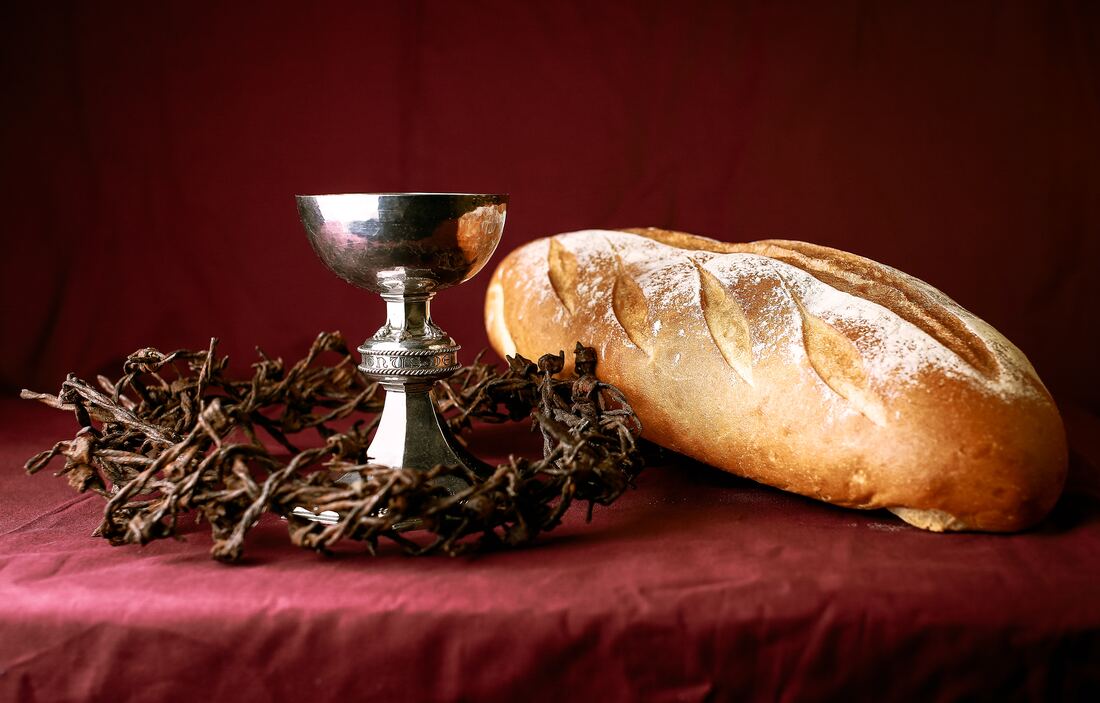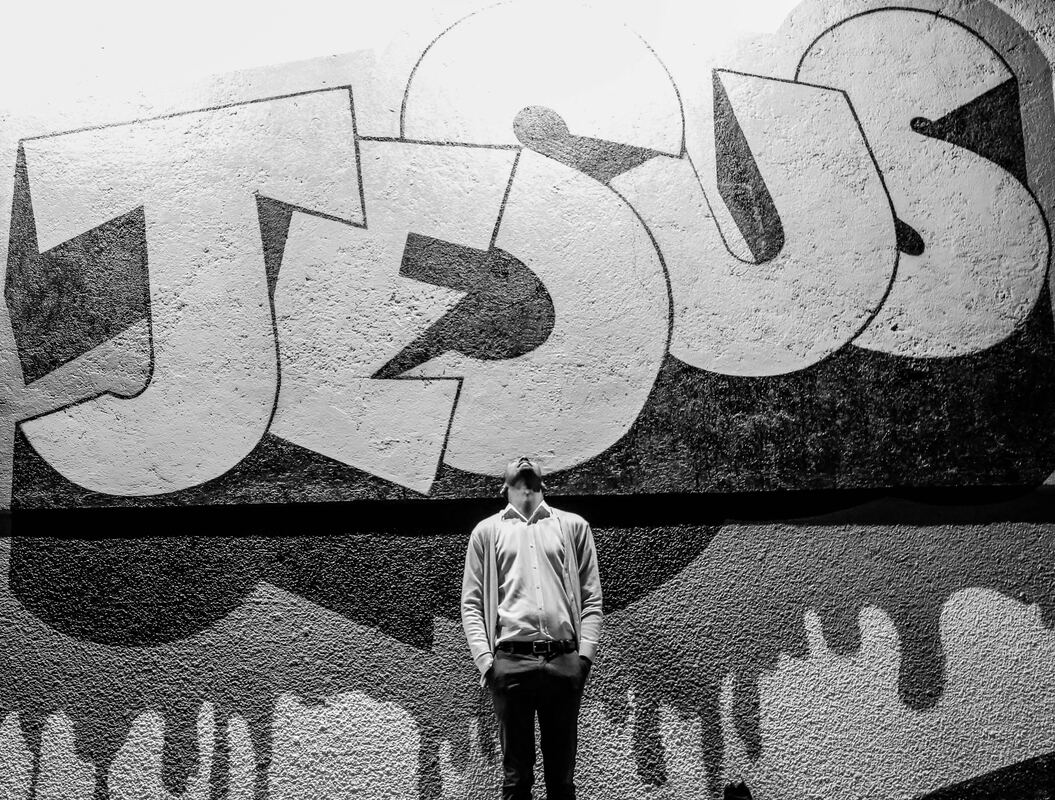|
In the earlier years of being a dad, Amond and I bought Israel an iconic, bright red, Radio Flyer wagon. As a good parent, it felt like the right thing to do. There was one problem. It came in a box in several pieces! Have you been there. Sitting, staring at instructions that don't quite give enough detail to make sense. (insert an Ikea joke!) I was new to putting things together for my kids. Since then, I have become a pro at the Christmas Eve construction projects!
I remember sitting there, scratching my head as I pieced this thing together. In hindsight, it was not that difficult, but somehow I found a way to mess it up! Perhaps the problem was my lack of focus. While I was busy putting this together, so was my son, Israel. He was a toddler tinkering away with me on this project. I was making this for him and he was wanting in on the action! When it was finally completed, the second time, he was able to sit in the wagon insisting that I pull him around...everywhere! This picture is not unlike the creation of everything that has ever been. "In the beginning God made the heavens and the earth" (Gen. 1:1). God the Father was not alone in creation though. Jesus was there. And not only was Jesus present and active in creation, but He was also the purpose of creation. You might say, in a very vague way, that God the Father was creating, with his Son, a beautiful red, Radio Flyer! Jesus was Present at Creation To understand this concept, it is important to understand that Jesus is God. In the Gospels we see that Jesus is fully man, but He is also fully God. He needed to eat and sleep, he grew physically and was tempted in the same way we are. We also see his divinity: walking on water, healing the sick, and even raising the dead! If Jesus is God, then He had to be at Creation. John 1:1 states, "In the beginning was the Word, and the Word was with God, and the Word was God. He was with God in the beginning." Jesus, before He put on flesh, was the very Word that spoke everything into existence. He was present in this act with God the Father and God the Holy Spirit. John makes it clear that this 'Word' is Jesus a few verses later in John 1:14, "The Word became flesh and made his dwelling among us." (NIV) It then reasons, that if Jesus is God and was present at Creation, then He was and is present and active in every situation and circumstance that follows. Jesus was the Purpose for Creation If I can take this a step further, I would like to point out that Christ was not only at Creation and active in creating, but He is the purpose of creation. Everything is about Him. Making Jesus simply a part of creation does not make this story throughout Scripture about Him. It could still put us in the driver seat. You might find yourself saying, "See, Jesus was there and decided to make us, therefore creation must also be made for us." This is simply not the case though. Read with me Colossians 1:15-17: "The Son is the image of the invisible God, the firstborn over all creation. For in him all things were created: things in heaven and on earth, visible and invisible...all things have been created through him and for him." (NIV) Creation was not simply made because of him, but creation was made for him. Think about that. His Father, did all this for Him! This makes Him the center of creation and the entire story that follows. Jesus is the Fulfillment of Creation He was likely present with Joshua before the battle of Jericho. He was present with the three Hebrew children in the fiery furnace. He was also there declaring the very Word of God, which He was, through the prophets to the nations of Israel and Judah. Jesus fulfilled Genesis 1 and everything since then. As you might have read in my previous post, Types not Typos, everything that is read and seen in Scripture will find fulfillment in Christ. How is this possible? Where is that fulfillment? What does this mean for me? I don't want to jump too far ahead, but we know that creation was cursed and broken from Genesis 3 onward. Ultimately, Jesus fulfills this at the end of Revelation: "Then I saw a new heaven and a new earth, for the first heaven and the first earth had passed away. Then the One (Jesus) seated on the throne said, 'Look, I am making everything new. I am the Alpha and the Omega, the Beginning and the End.' (Revelation 21:1; 5-6). There is fulfillment of creation that is found before this though. In us, we can find the fulfillment of creation! How? Paul calls it a treasure that is inside of us in 2 Corinthians 4:7-9. A chapter later, he makes it a bit more clear how creation is fulfilled by Christ through us. "Therefore if anyone is in Christ, he is a new creation; old things have passed away; behold, all things have become new." (2 Cor. 5:17) This is an amazing thing to see revealed in each and every one of us who confess Christ. You and I are God's workmanship on display, showcasing Christ for a lost and broken world to see! Let's shine bright!
2 Comments
Adam: well-known Hebrew name meaning "man, of the earth."
There are many famous Adam's, and I am not one of them! From Adam West, the original batman (nah, nah, nah, nah...batman!) to Adam Sandler, but none are more famous than the first recorded person mentioned in the Bible: the OG Adam. "Then the Lord God formed a man from the dust of the ground and breathed into his nostrils the breath of life, and the man became a living being." (Gen. 2:7) The word for man in this verse is literally, adam. Another word that is closely related to this is adamah, which is used for the name Adam in verse 20, and means ground. Thus, Man, of the Earth. And not just another creature. The only creation that God formed with His hands, not just with His Words. One that has the very breath of His Maker in him. One who was made in the image and likeness of his Creator. In the same way, every person who came from Adam and Eve can be said to have the very breath of God in them as well. In a world gone mad, this is where we must find our identity. From the very beginning, knowing who we are because we know whose we are. Not only were Adam and Eve the first parents to ever live, they were also the first sinners. If you read their account and then continue through to Genesis 11, you will find out how quickly their offspring fully embraced their sinful nature. Once again, important to note that we are not only sinners because of what we do, or don't do, but because of our very nature! Skip ahead about 4000 years and we see Jesus coming onto the scene. This is predicted so clearly in Genesis 3. This seed from Adam and Eve will crush the serpent! Side note: For those who do not like planning, please know that God loves planning. He began a plan 4000 years before it came fully into view! Let the Holy Spirit be a part of the planning from the beginning. This is called being a steward of everything God gave you. Don't wait to ask Him to bless what you have been doing on your own! Jesus, before He is a second Moses or Elijah, has to be the second Adam. Romans 5:12 states, "Sin came into the world through one man, and death through sin." He continues to say, "death reigned from the time of Adam to the time of Moses, even over those who did not sin by breaking a command, as did Adam, who is a pattern of the One to come." Who is this ONE to come? It is Jesus. Adam is a type of Christ, whose character you might say, finds fulfillment in Christ. I like to say, in the same way Adam and Eve took the fruit off of the tree, Jesus, in a sense, put the fruit back on the tree! Humanity received its sinful nature from Adam, and believers and followers of Christ can receive a righteous nature through Jesus! This is why Luke traces his genealogy all the way back to Adam. Jesus is not redeeming a few people during a short window. He came to die for all humanity, past, present and future. "But to all who believed him and accepted him, he gave the right to become children of God." (John 1:12) In my last post, Christ in Creation, I mentioned that we are now new creations in Jesus. The old nature is put off and the new is put on. This can not find its roots in Moses or even Abraham, but must have its roots in Adam. New creation is a telling statement that must go back and connect to the original creation. Think about this. After day 6, God rested and stopped creation. Did creation keep going? Absolutely! From the moment God said, "let there be light," God created and this process is still in effect. We are image bearers and therefore creators as well. New life is also created in us, as well as ideas, inventions, business and everything in between. But for the first time since day 6, God created once again. At the moment of salvation, God made a new creation out of you and me! And if it is anything like the first creation, God is willing to get his hands dirty. He is willing to bend low and listen to our hearts and our cries. He is willing to work on our behalf. He willing to walk with us through the fire and deep waters we so often find ourselves in! Once again, I am overwhelmed and thankful for the love of Christ. He did not leave us in our sins in Genesis 3, but was willing to come and redeem everyone that was lost! Our God is so good and so faithful! So much more so than we deserve! Can we hear some praise and thankfulness today for the Second Adam, who is Jesus! If you have read the Bible for any length of time, or sat through a church service growing up, you have probably heard the name Melchizedek mentioned once or twice. To me, he is one of the most important people in the Bible, while being one of the least mentioned.
This King and Priest, which we will get to in a moment, is first mentioned in Genesis 14. He is introduced as King of Salem and priest of the God Most High. We see him show up again in the book of Psalm, chapter 110. This Psalm is prophetic of Jesus, and is even quoted by Jesus in his earthly ministry. Verse 4 says, "You are a priest forever, in the order of Melchizedek." It is important to note these verses, because not only is the messiah going to be king, which was understood perhaps, but he will also be the priest. David did not reference kingship for Melchizedek, but rather his priestly status. Last, we see him mentioned a third time in the book of Hebrews. The author does a fantastic job at bringing to light, that Melchizedek is a forerunner and type of Christ figure. So much so, that I almost passed him over and moved on. In Hebrews 7, we see that he has no beginning or end, in a sense. He is also greater than Abraham, because he blessed Abraham, not the other way around. Sometimes, I have wondered if Melchizedek, along with a few other people mentioned in the Old Testament, actually was Christ in human form. I know this may be ridiculous to think, that Christ would reign in Salem for a time. These are the questions though. I think it is healthy to ask and search. Jeremiah the prophet states in Chapter 29 of his book, "You will seek me and find me when you seek me with all your heart" (NIV). This is exactly what we are doing as we travel through the Old Testament: searching for Jesus. He is to be found. According to Christopher Wright in his book, Knowing Jesus Through the Old Testament, "The author of Hebrews held that Jews received not only shadows and hints of the gospel, but that they could actually have known the gospel if they had understood what God was saying to them in the Old Testament." Perhaps a certain few of them did. Abraham being one of them. Again, the author of Hebrews says this of him, "For he was looking forward to the city with foundations, whose architect and builder is God" (NIV). So what exactly did Abraham see and find when he had this encounter with Melchizedek? If it was not Christ himself, this man was certainly as close as one could come. First, Melchizedek was the King of Salem. This would later be what we know of as Jerusalem. Not only was this city known as the city of David, but it will also be the place that Jesus actually rules from after the Great Tribulation. Second, when Abraham rescues his nephew Lot and the others from the surrounding areas, Melchizedek meets him with bread and wine. This is the first picture of communion that is seen in Scripture. Why would he doe this? What did he already know? Without the breaking of Jesus' body, and the shedding of his blood, there is no forgiveness or healing. What a foreshadow of the last supper! Third, Melchizedek blessed Abraham. Abraham is the father of our faith for good reason, but it is alway the greater that gives the blessing. Abraham to Isaac, Isaac to Jacob and Jacob to his sons. Who is so great as to give a blessing to the "friend of God?" Last, after being blessed, Abraham gives a tenth of everything to this King and Priest. Once again, this is a foreshadow of giving a tenth, or a tithe to God. Neither communion or tithing was practiced until the New Testament, but be assured, God was present and setting things in order for His church and for you, from day one. He is the same yesterday, today and forever! All right students, class is in session! Before we can venture into finding Jesus, we must lay out the ground rules. Just like playing backyard baseball or Marco Polo in the pool with friends on a hot summer day, rules are a must. When studying Scripture, whether it is for personal edification or the benefit of others, it is important to not get sucked into an easy, but wrong interpretation of Scripture. It is all God-breathed and useful, but the question is now asked, how is it useful? There is a purpose for Scripture, but it must come from a correct way of thinking. The Bible should not mold to one's life, but rather, one should mold their life completely to the Bible. To do this, you should avoid what biblical theology calls moralism and allegory. You still with me?! Interpreting Scripture with moralism starts with the end in mind. Rather than see Scripture as the author intended it to be read, you instead look for meaning and life application before putting it through the lens of the Gospel. In other words, moralism is behavior modification. This is not the goal of the Gospel. Behaviors should change as you encounter Jesus, but it is because of your response to His Great love. You cannot jump directly from reading the text to giving application to life. The other side of the coin, you might say, is allegory. This idea finds hidden meaning in scripture where there is not any. Some times what the Bible says is what it means. Graeme Goldsworthy calls out those who interpret this way and says, "In the case of the Bible, the history of the Old Testament was seen as worthless for the Christian." What does history matter to us today? It matters a great deal! There is no context or culture without history. This can mess everything up for the reader. In all reality, allegory puts the reader in the place of priority and authority. This Christian walk we are all on then becomes about us, and hardly about Jesus at all! Think about how often we do this. Jesus is here for us, rather than us being here for him. Can I tell you that you are not the hero of this story? You are not even the main character, nor should you be. This is not about you. To interpret the Bible in such a way will skew your view and interpretation of Scripture and puts you in the seat of God. It is essential for what we read to go through several lenses, the most important being the Gospel. If the goal is to read correctly so we can respond correctly, we must come to terms with what history looked like, what the authors said and intended in that culture and context, and then view it through the lens of Christ. Anything that is then read and seen, should ultimately find fulfillment through Christ. In comes typology. Hang with me! I like how George P. Landow puts it, "Typology is a Christian form of biblical interpretation that proceeds on the assumption that God placed anticipations of Christ in the laws, events, and people in the Old Testament." There are 'types' that we see in Scripture such as Moses and David. It does not have to be people either. We will walk through Psalm 23 and the bronze serpent as well. These 'types' are truths that are revealed over time, not in the moment, then or now. "Types are not arbitrary correspondences invented by the biblical authors, but genuine accounts of what really took place." - J.M. Hamilton These 'types' are exactly what we will be looking at in the Old Testament. I am thankful that today we can look back and see Christ 'types' in these wonderful people and stories and not typos. We can see that God decided to make right what Adam made wrong through Jesus, the second Adam. He did not call Adam a typo, but rather finished the story. He did not erase history but made history. He did not even abolish the law, but rather fulfilled it. That is how good Jesus is! He came to make wrong things right. He came to give sight to the blind and bring the lost home as found. This is who Jesus is. He allows these types to be foreshadows and forerunners, finding ultimate fulfillment in Jesus. He is the "author and finisher of our faith, who for the joy that was set before Him endured the cross" (Hebrews 12:2, NKJV). In the same way, today we can find fulfillment in Christ. He does not call you a typo either. If you are in a place of sin, discouragement, guilt, or heartache, He is not done with your story! If you would let Him, Jesus can finish it through the cross and make you a 'type' as well. You can be forgiven and then share that forgiveness with others! Adam was not a typo and neither are you! You can be a type of Christ to this world. "A chosen people, a royal priesthood, a holy nation, God's special possession, that you may declare the praises of him who called you out of darkness into his wonderful light" (1 Peter 2:9, NIV). Now, let's begin our journey... "The greatest event in history was when Jesus came to live among the people He created. The greatest event in your life was when Jesus came to live in your heart." - Elmer Towns This story of Jesus did not begin the day He was born in a manger in Bethlehem or even as He took His last breath upon the cross. The moment God spoke everything into existence, Jesus was there. He was present, as seen in John 1, from the beginning of time and is the epicenter of the entirety of the Bible. Christ is at the forefront of creation, the gospel, the revelation of John and everything in between. It is simple and easy to see Jesus at work in the Gospels. He was born, alive, doing miracles and then physically died to save us. It is also simple to see Him in the remainder of the New Testament. These writers were sharing Jesus in everything they did, everywhere they went. It is not always as simple to see Him in the Old Testament though. Over the course of the next few blog posts, we are going to find Jesus in the Old Testament. If this is a story all about Him, He is there, waiting to be found. Christopher Wright makes this clear when he states, "Somehow, and not surprisingly, the whole Bible comes to make much more sense when Jesus Christ, as the Bible's center of unity, is brought into focus in a way that affirms rather than overlooks all that went before him." If the Old Testament is one entire story looking for the one who can be the fulfillment of the law and the savior of sin, the New Testament strives to show that this very person is Jesus. He is the one the Old Testament has been talking about and searching for the entire time! Iain Duguid says, "To understand the climatic message of the New Testament properly, you first need to understand the preparatory message of the Old Testament. Only then will you be ready to understand the mission of the Christ whom God has sent." These blogs may be a bit more academic than 'fun,' but I promise that they will not disappoint. This journey will lead us to a stronger foundation built through the Old Testament, so that Jesus can be lifted high in our lives. Would you join me in finding Jesus in the Old Testament? Mark 11 I will be completely honest: I'm not sure I have ever seen a fig. I know I haven't in real life. I have eaten plenty of fig newtons in my day. They are delicious! I am also the proud owner of a fiddle-leaf fig tree. It is in my dining room and now taller than I am. Joanna Gaines has something to do with this tree in my house, I'm sure!
Why all this talk about figs? Maybe you know where I am going by now. Let's quickly read a passage out of Mark 11: "Now the next day, when they had come out from Bethany, (Jesus) was hungry. And seeing from afar a fig tree having leaves, He went to see if perhaps He would find something on it. When He came to it, He found nothing but leaves, for it was not the season for figs. In response Jesus said to it, 'Let no one eat fruit from you ever again.'” Jesus is Hungry There is so much here that I want to share with you, but let's start with this idea that Jesus was hungry. Now this I can relate to! He is a person just like any of us. Being hungry is a state of being for me. My son is the same way at 15 and can eat whatever he wants as he is growing. For me, I have had to learn how to live hungry, as my metabolism isn't the same anymore! Can anyone else relate?! So, Jesus is hungry and sees this fig tree as the solution to his hunger. We all know that "you aren't yourself when you're hungry!" Since there weren't Snickers around during this time, Jesus goes for the figs. When he gets closer to the tree, he realizes that there aren't any figs, curses the tree and moves on with life... Hold on! Jesus curses the fig tree? It wasn't even the season for figs! The poor fig tree. The Kingdom of Heaven Let's back up for a moment to the beginning of Jesus' ministry on earth. The Bible tells us that Jesus went around preaching the repentance of sin and that the Kingdom of Heaven was at hand. Later, in the Sermon on the Mount, Jesus teaches his disciples, and those on the hillside, how to pray. In that prayer he said, 'Your kingdom come, your will be done on earth as it is in heaven.' There is a grand conception that Jesus is introducing to us that the Kingdom of Heaven is here and now, not reserved for somewhere else and later. In fact, if you read in Revelation 21, it shows that heaven is in fact here on a new earth! What does all of this have to do with a fig tree. I'm getting there. Let's first understand that the principles of the heavenly kingdom, can and should be lived out here in our earthly one. No longer should we use this "heaven is far off" mentality to excuse our normal, Spirit-less lives. Fig Tree In the Garden of Eden (I know I'm going even further back in the Bible!) there were two trees, the Tree of Knowledge of Good and Evil and the Tree of Life. Fast forward all the way from the beginning to the end in Revelation 22, we see that one of these trees is still in existence: the Tree of Life. This tree is planted by the stream of water flowing from the throne room of God! Here is where the fig tree comes in. This Tree of Life produced fruit in every month and every season. It is clear in Scripture that it wasn't the season for figs, but that is the earthly way of thinking. Jesus came to transform the way that we think to a heavenly way. In the heavenly kingdom, trees produce fruit at all times. There is no "out of season" for fruits like we see at your local grocery store. You and I This should speak to us beyond a fig tree. In fact, you and I are the fig tree. Our earthly mindset says that we are able to bear fruit periodically in our lives. It says that every once in awhile, something good will come of what we have said or done. Note, the fruit we bear is not for us, but for those around us. The Kingdom mindset tells us that we can bear fruit in all seasons. One of my favorite passages in the Bible is found in 2 Kings 4. Elisha is meeting in Gilgal with his band of prophets and there is a famine in the land. He looks at his servant and asks him to feed the prophets. Earthly mindset: There is a famine, how can I feed these men? Kingdom mindset: There is a famine, but I can produce fruit in season and out of season. Another familiar passage that comes to mind as I wrap up, is the boy with his lunch. Before this boy came forward with his fish and loaves, Jesus asked his disciples to feed the 5000 men, plus women and children. The disciples had an earthly response: "We don't have enough money or food to sufficiently feed this many people." I love how Jesus is not shook by this earthly mindset. Instead, he insists that they sit in small groups so that they may be fed. Jesus is asking the same of you and me. Whether we have a lot or little, God is asking us to use it to advance His Heavenly Kingdom here on earth. His desire is that we bear much fruit, in season or out of season. |
All Scripture is breathed out by God and profitable for teaching, for reproof, for correction, and for training in righteousness. Categories
All
|






